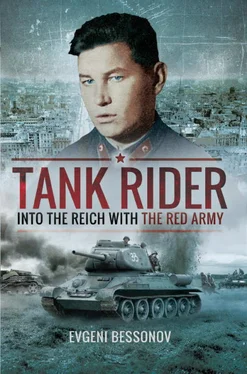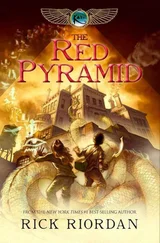The company reached the village, which only had one street, and we had to check the houses just in case. A threatening silence hung in the air. I was used to relying on intuition, and I did not believe that there weren’t any Fritzes in the houses. Machine-gun platoon leader Lieutenant Petr Malyutin from our MG company, however, did not agree with me, saying: ‘There are no Fritzes in the village, because it is quiet.’ It was this very quietness that scared me. I was about to send a squad of soldiers to check what was going on in the village, when Malyutin went out to the middle of the road and started to inspect the village through binoculars. A shot sounded – the bullet hit him right between the eyes and the binoculars fell apart into two pieces. Lieutenant Petr Nikolaevich Malyutin was killed on the spot. He was older than we were – he was around 36 years old; we dubbed him either ‘grandfather’ or ‘old man’.
There were no more shots; soldiers hid behind the huts, not daring to go out in the street. We did not attack the village at all. The battalion commander sent an order to advance towards the river in order to capture the bridge across the Dniester and further towards the city, leaving the village alone. We said, to hell with those Germans in the village, they would have had to retreat anyway when we captured the bridge. An order is an order, so I left the village with my soldiers and we quickly advanced across a field to the river. As soon as we got 100 to 150 metres away from that ill-fated village, we saw a line of Germans attacking us from the rear. The Germans walked openly and fired submachine-guns at our line. To be honest, we were lost when we saw the German attacking line behind us. Despite of all soldiers being experienced and having been in all kinds of troubles, we were taken aback.
I did not lose self-control and shouted to my soldiers: ‘Fire on the Fritzes, fire!’ I also shouted to the Maxim machine-gun crew: ‘Turn the machine-gun and fire on the Fritzes!’ I was not even shouting, I was yelling at the top of my lungs. Many soldiers opened fire, while the others ran from the enemy’s line, retreated and thus frustrated Tsikanovski’s machine-guns – they could not fire on our soldiers, of course.
Neither I nor the other officers managed to bring order and organize resistance, no matter how hard we tried – soldiers dispersed, at least it was good that many fired on the Fritzes. When no more soldiers were left in front of me, I also ran along the hillside to the road and lay in a ditch. I saw a light DP machine-gun, some soldier dropped it in panic, so that he could run faster – I grabbed it and opened fire on the line of German soldiers, as there was ammo in the drum.
As I fired, my garrison cap fell from my head, I put it back on and continued to fire, before I ran out of ammo. I did not have my own submachine-gun with me, although it would have been nice to have it in that moment. When I ran out of ammo, I withdrew, sometimes sneaking and sometimes in short rushes to the rear, where the fighters ran, or rather, frightened soldiers, one could not call them fighters – they had got scared by a bunch of 40 or 50 Germans! Later they said that there was also an APC, but they must have lied – the eyes of fear see danger everywhere.
Our group was not larger than the German one, though, but we had Maxim heavy machine-guns, although they ceased fire quite soon. It was either due to my fire or that of some stoic soldiers, but the Germans did not pursue us and quickly left towards the bridge, carrying their dead and wounded – apparently, our fire on them had been successful.
The Germans left, while we gathered together and started to debrief the clash with the other officers (including 3rd company commander Kostenko) and gathered the scattered soldiers. Our subordinates assembled too. I noticed that machine-gunner Ishmuhammetov sat there without a weapon, and realized that it was he who had dropped the machine-gun; I sent him to pick it up. It is infamy for a fighter to drop a weapon. Soldiers came back with a feeling of guilt, they were ashamed of their fear and cowardice in battle. The proud ones suffered twice as hard in their feelings, we also did not spare ourselves.
We distributed the returning soldiers between the companies and ordered them to dig in just in case. If memory serves me well, by some miracle we had no losses. The machine-gun platoon of the 3rd company under Lieutenant Tsikanovski had disappeared during the fight, but as it turned out later, they had had to hide in thick vegetation on the Dniester shores for some time. Several days later they caught up with the battalion on the march.
We were all hungry after the skirmish and arranged some snacks. During the meal one of the officers asked me: ‘Where did you tear your garrison cap?’ I took it off and saw two torn holes in it – in the front and in the back. It was only then that I recalled that the garrison cap had fallen from my head as I fired the machine-gun and told the story. The guys told me: ‘You were really lucky, Bessonov, if that sniper had aimed several millimetres lower, you would have been dead.’ They were right, I was lucky, really lucky. How many times have I been lucky? Quite a few. Luck at the front is quite an important thing. However, such luck does not happen very often.
By the evening our company, as well as the other companies of the battalion dug in on a dominant hill with a steep slope towards the river, some 150 metres from the river. Some units to the left us also tried to attack Sambor. The cannonade lasted some thirty minutes, Katyushas also took part, as well as heavier missiles, launched from the ground, not from trucks. Sometimes their missiles (M-31) were launched together with the launch frame, in order not to waste time for preparation. However, those units also attacked in vain, their assault was repelled and the Germans still held the bridge across the river and Sambor proper.
On the night of 2 August a heavy rain fell from the sky, water fell like a shower. The deluge continued all night and the whole day after. We had to ladle water out from the trenches with mess kits, and we were all soaking wet. The soil was so saturated with water that it turned into a total quagmire. In the evening the Germans decided to drive us out from that hill. Eight to ten T-VI Tiger tanks emerged from the bushes by the river. Probably, there were more Tigers, but I could not see all of them. At the time I did not understand how Tigers had appeared against us, and even now I cannot explain how they appeared. Regardless of how they made it there, the main thing was their assault on our defences. The Tiger is a serious thing. Our 76 mm gun could penetrate its armour only at a range of 50 metres.
The Tigers advanced slowly, with frequent stops, sometimes opening fire. We all hid in trenches, afraid to make a move. A tank could fire even on a single soldier, but they fired over our heads on some targets in the undergrowth behind us. It was good that infantry were not escorting the tanks. Apparently, they wanted to squash us with tanks without infantry support. At that very moment the rain shower and wet soil, as well as the steep slope played their positive role. The tanks were some 50 metres from us, when all of a sudden a miracle happened – the Tigers skidded on the wet soil and stopped. The tanks were stuck on one spot, their tracks were spinning, but the tanks could not move. We were lucky that because of the Tiger’s weight its tracks did not have good cohesion in the mud. The tanks could not approach our defences and they retreated to the line of attack, and then disappeared from our sight. Had it not been for the rain, they would have squashed us in our trenches. It was hot before the rain fell, and the soil was dry. Nevertheless, we suffered casualties – it was in that fight that Lieutenant Karpenko was killed and I again had to take over the company, though not for long.
Читать дальше












